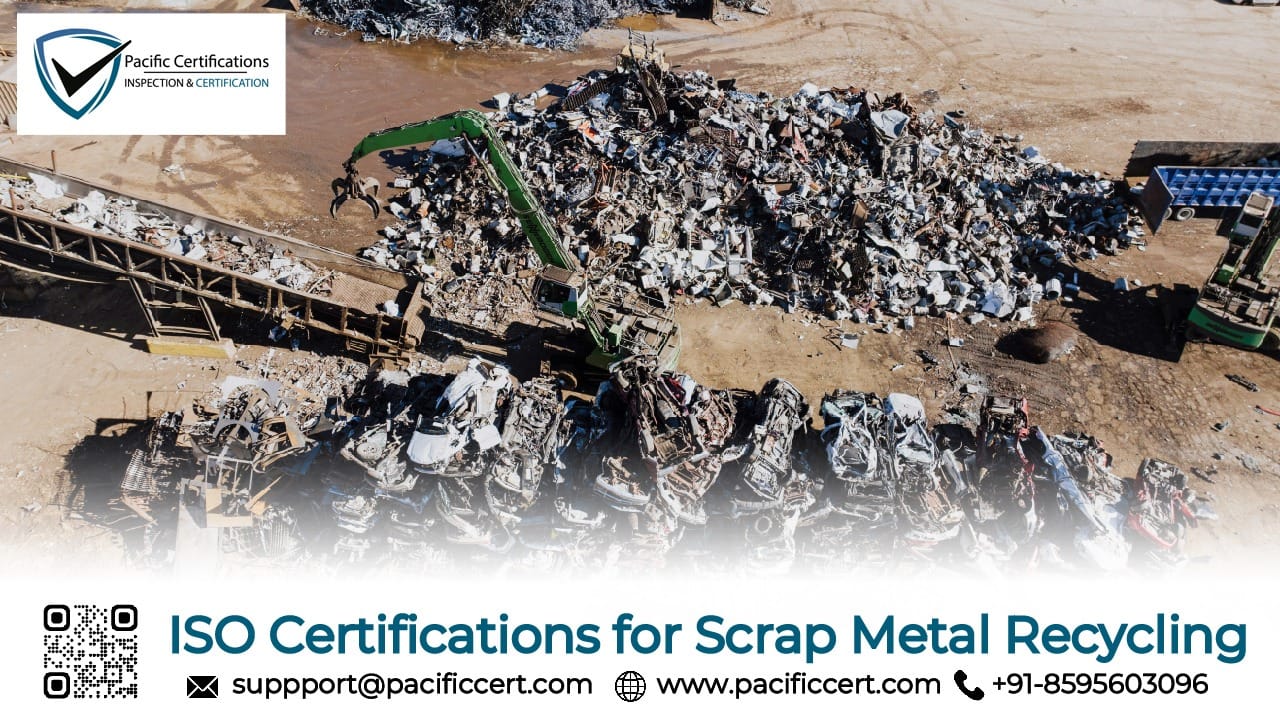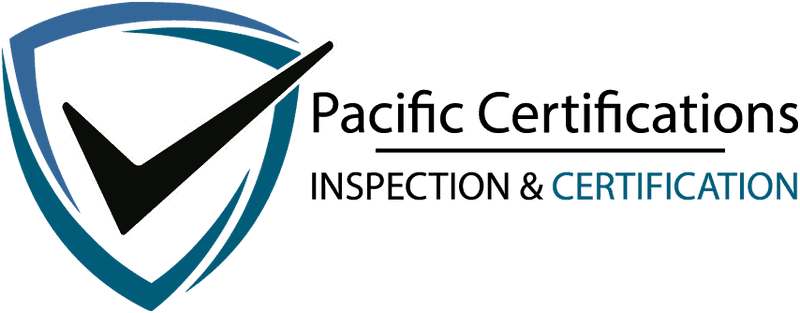ISO Certifications for Scrap Metal Recycling Businesses, Requirements and Benefits

Introduction
Scrap metal recycling businesses operate at the intersection of environmental responsibility and industrial processing. Whether handling ferrous or non-ferrous metals, end-of-life vehicles, demolition scrap, electronic waste, or industrial offcuts, recyclers must ensure safe handling, pollution control, worker safety, material traceability, and regulatory compliance. With rising global demand for sustainable raw materials and circular economy initiatives, ISO certifications help recycling enterprises strengthen governance, reduce operational risks, and demonstrate accountability to regulators, suppliers, and industrial buyers.
In the scrap recycling sector, trust is built on traceability, safe handling, and environmental discipline, not just metal volume.
Looking to achieve ISO certification for Scrap Metal Recycling? Contact us at [email protected] or call +91-8595603096 to get started today!
Quick Summary
Scrap metal recyclers are increasingly adopting ISO standards to ensure environmental compliance, worker safety, material quality consistency, and sustainable recycling practices demanded by manufacturers, exporters, and government regulators.
Applicable ISO Standards for Scrap Metal Recycling
A variety of ISO certifications are relevant to the scrap metal recycling industry. These standards address various aspects such as quality management, environmental performance, and occupational health and safety. Below are the key ISO certifications applicable to the sector:
Standard | Description | Relevance to Scrap Metal Recycling |
|---|---|---|
ISO 9001 | Quality Management | Consistent material quality, supplier evaluation, process control |
ISO 14001 | Environmental Management | Pollution control, waste handling, emissions and spill management |
ISO 45001 | Occupational Health & Safety | Worker safety around heavy equipment, lifting, and hazardous materials |
ISO 27001 | Information Security | Data protection for trade records, supplier contracts, compliance documents |
ISO 37001 | Anti-Bribery Management | Ethical sourcing, prevention of illegal scrap movement, compliance assurance |
ISO 50001 | Energy Management | Fuel and power efficiency in shredding, cutting, and processing operations |
ISO 9001: Quality Management System (QMS)
ISO 9001 focuses on establishing a robust Quality Management System that ensures consistent service quality, customer satisfaction, and operational efficiency. For scrap metal recycling businesses, this certification emphasizes the need to maintain high standards in material processing and customer interaction.
ISO 14001: Environmental Management System (EMS)
Environmental sustainability is at the heart of ISO 14001. This standard aids organizations in identifying and managing environmental impacts, such as waste management and resource conservation. It is particularly important for the scrap metal recycling industry due to its direct influence on environmental health.
ISO 45001: Occupational Health and Safety Management System
ISO 45001 addresses workplace safety. It ensures that businesses minimize risks related to occupational hazards, especially critical in scrap metal recycling, where workers are exposed to heavy machinery and potentially hazardous materials.
ISO 50001: Energy Management System
ISO 50001 focuses on energy efficiency and sustainable energy use. Recycling facilities can benefit by optimizing energy consumption during metal processing, leading to cost savings and reduced environmental impact.
ISO 27001: Information Security Management System (Optional)
While not directly related to recycling operations, ISO 27001 can be valuable for companies managing sensitive data, such as customer records and business transactions.
Click here to find out more applicable standards to your industry
At Pacific Certifications, we specialize in conducting audits and issuing ISO certifications tailored to the scrap metal recycling sector. As an accredited certification body, we work closely with organizations to verify their compliance with ISO standards. Contact us via email at [email protected].
Why ISO Certifications Matter
Scrap yards and recycling facilities face unique risk challenges such as hazardous material exposure, heavy machinery operations, cross-contamination, documentation accuracy for regulated scrap, and export compliance. Buyers, including automotive manufacturers, foundries, and construction companies, now prefer or mandate certified recycling partners to ensure ethical sourcing, reduced emissions, and compliance with environmental laws. ISO certifications provide structured management frameworks that improve safety, transparency, and quality performance while supporting business scalability and market access.
What are the requirements of ISO Certifications for Scrap Metal Recycling?
To comply with ISO standards, businesses in the scrap metal recycling sector must address specific requirements unique to each certification. Here is a breakdown for the most relevant ISO standards:
General requirements:
- Establish system boundaries across scrap yards, sorting lines, cutting and shredding units, storage zones, and logistics with clear responsible roles.
- Conduct safety and environmental risk assessments covering lifting hazards, fire exposure, chemical leakage, dust control, and material traceability.
- Maintain documented SOPs for material sorting, cutting, weighing, chemical checks, waste disposal, emergency handling, and hazardous scrap segregation.
- Train crane operators, forklift drivers, sorters, cutters, weighbridge staff, supervisors, and administrative personnel in safety and compliance protocols.
- Implement emergency response mechanisms including spill kits, fire suppression setups, first-aid readiness, and incident reporting processes.
- Conduct internal audits, monitor KPIs such as accident frequency and contamination rates, review performance, and address non-conformities.
Specific Requirements:
ISO 9001: Quality Management System (QMS)
- Quality Policy: Establish and communicate a quality policy aligned with the organization's objectives.
- Process Documentation: Clearly define and document operational workflows, from material collection to processing.
- Risk-Based Thinking: Identify risks and opportunities to improve operational outcomes.
- Customer Focus: Monitor customer feedback and implement strategies to improve satisfaction.
- Continuous Improvement: Regularly review processes for efficiency and effectiveness.
ISO 14001: Environmental Management System (EMS)
- Environmental Policy: Define an environmental policy addressing compliance and sustainability goals.
- Environmental Impact Assessment: Identify and assess environmental impacts associated with recycling activities.
- Legal Compliance: Ensure adherence to all applicable environmental laws and regulations.
- Waste Management: Implement effective waste disposal and pollution control measures.
- Monitoring and Reporting: Establish metrics to monitor environmental performance and report progress regularly.
ISO 45001: Occupational Health and Safety Management System
- Hazard Identification: Conduct thorough risk assessments to identify workplace dangers.
- Safety Training: Provide comprehensive training to all employees on safety procedures and equipment usage.
- Incident Reporting: Implement a system to report and address workplace incidents effectively.
- Emergency Preparedness: Develop and test emergency response plans for incidents like fires or chemical spills.
- Worker Participation: Engage employees in developing and maintaining safety protocols.
ISO 50001: Energy Management System
- Energy Policy: Establish an energy management policy aligned with operational goals.
- Baseline and Metrics: Identify a baseline for energy consumption and set measurable improvement targets.
- Energy Audits: Conduct regular audits to pinpoint inefficiencies and areas for improvement.
- Operational Controls: Implement systems to monitor and optimize energy use during material processing.
- Awareness Training: Educate staff about energy-saving practices and their importance.
ISO 27001: Information Security Management System (Optional)
- Information Security Policy: Develop a policy to manage and protect digital and physical data.
- Risk Assessment: Identify potential information security risks and implement mitigation strategies.
- Access Control: Restrict access to sensitive data to authorized personnel only.
- Incident Response: Create a protocol for responding to data breaches or security issues.
- Monitoring and Auditing: Regularly monitor systems and conduct audits to ensure compliance.
Tip: Start by mapping all in-yard movement and processing flows, from scrap arrival and inspection to segregation and dispatch. Create documented controls around each step, especially hazardous scrap handling, because traceability and safety form the core of industry credibility.
Partner with Pacific Certifications for your ISO certification needs. Email us at [email protected] or call +91-8595603096 for more details.
What are the benefits of ISO Certifications for Scrap Metal Recycling?
The advantages of adopting ISO certifications are multifaceted. Here are the key benefits for scrap metal recycling businesses:

- Improved quality control and material classification accuracy, leading to stronger supplier confidence and premium buyer pricing.
- Higher acceptance in regulated export markets and industrial supply chains that require certified, compliant recycling partners.
- Reduced workplace hazards and accident rates due to formalized safety programs, machinery protocols, and operator training.
- Better environmental impact control through documented waste handling, spill prevention, dust suppression, and pollution monitoring.
- Enhanced business credibility that supports contract bidding, government approvals, and sustainable procurement programs.
- Increased efficiency and reduced operational losses through systematic inspection, process planning, and energy-efficient practices.
The global scrap recycling market is projected to exceed USD 90 billion by 2030, with annual growth driven by steel demand, automotive recycling, and green manufacturing commitments. Governments in the EU, US, India, and GCC are tightening regulations on illegal scrap movement, pollution control, and extended producer responsibility (EPR), increasing the role of documented systems like ISO 14001 and ISO 45001.
India’s Bureau of Indian Standards (BIS) and global automotive OEMs now prioritize ISO-aligned recyclers for supply chains. Electrification trends and EV battery recovery initiatives are expanding safety and environmental expectations. ESG reporting has accelerated, with over 60 percent of large metal-consuming enterprises seeking certified recycling partners by 2026, underscoring ISO certification as a commercial differentiator, not just a compliance tool.
How Pacific Certifications Can help?
Pacific Certifications provides accredited by ABIS to provide ISO certification services for scrap yards, metal processing units, recycling depots, and associated logistics and trading entities. Certification enables recycling businesses to validate their environmental responsibility, worker safety systems, ethical sourcing framework, and process quality management in accordance with international standards. Independent certification demonstrates operational maturity, strengthens supply-chain trust, and supports qualification for high-value industrial and export contracts.
Key support includes:
- Accredited ISO certification audits for quality, environment, safety, and ethical governance standards
- Independent evaluation of recycling operations, scrap handling controls, compliance documentation, and emergency readiness
- Structured audit findings highlighting strengths and improvement areas to enhance system maturity
- Transparent certification decision in alignment with global accreditation requirements
If you need support with ISO certification for your Scrap Metal Recycling business, contact us at [email protected] or +91-8595603096.
FAQs: ISO Certifications for Scrap Metal Recycling
What is the importance of ISO certifications for scrap metal recycling?
ISO certifications ensure businesses adhere to global standards, improving quality, safety, and environmental management while enhancing customer trust.
Which ISO certifications are relevant to the scrap metal recycling industry?
Key certifications include ISO 9001 for quality, ISO 14001 for environmental management, ISO 45001 for occupational safety, and ISO 50001 for energy management.
How does ISO 14001 benefit the scrap metal recycling industry?
ISO 14001 helps organizations manage environmental impacts, ensuring sustainable practices like waste management and pollution control.
Can Pacific Certifications assist with ISO implementation?
Pacific Certifications focuses on conducting audits and issuing certifications but does not provide implementation or consultancy services.
What are the latest trends in scrap metal recycling for 2024?
The industry is evolving with government incentives, advanced recycling technologies, and increased emphasis on ISO-certified sustainable operations.
How can businesses get certified with Pacific Certifications?
Contact us at [email protected] to schedule an audit and begin your journey towards ISO certification.
Read More at: Blogs by Pacific Certifications
Author: Poonam

